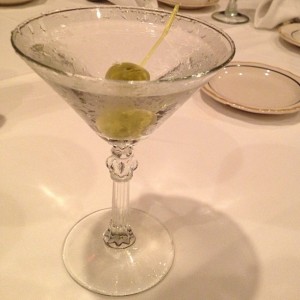Yesterday, CBS Local published a list of the best martini bars in Chicago. I had a few things to say about it.
 The piece is poorly written and not well-informed. Even if you concede the popular use of the term “martini” no longer means a certain type of drink with gin (or, OK, vodka, if you’re a heathen) and vermouth with an olive, onion or lemon twist and instead means any cocktail served in a triangle-shaped glass – which might be fine! words evolve over time! – it’s laden with awkward or repetitive phrasing like “stylish characters have made the drink even more fashionable by ordering them” or the way Fireplace Inn’s martinis are twice described as afterthoughts to the food. And mentioning Martini Club’s name three times in its writeup seems more about boosting the piece’s SEO value, not the reader’s knowledge, especially if you suggest martinis pair well with Cuban sandwiches.
The piece is poorly written and not well-informed. Even if you concede the popular use of the term “martini” no longer means a certain type of drink with gin (or, OK, vodka, if you’re a heathen) and vermouth with an olive, onion or lemon twist and instead means any cocktail served in a triangle-shaped glass – which might be fine! words evolve over time! – it’s laden with awkward or repetitive phrasing like “stylish characters have made the drink even more fashionable by ordering them” or the way Fireplace Inn’s martinis are twice described as afterthoughts to the food. And mentioning Martini Club’s name three times in its writeup seems more about boosting the piece’s SEO value, not the reader’s knowledge, especially if you suggest martinis pair well with Cuban sandwiches.
The author of the above also wrote a questionable piece on the best local rock bands in Chicago, the objections to which were summed up by Chicagoist: “This list is great, if you’re looking to travel back in time to 2004…”
So, a site with little authority on either rock bands or food & drink repeatedly employs a writer not gifted with either knowledge or a kind editor. Who cares, right? Plenty of other stuff to read on the Internet. If you don’t like it, don’t read it!
Except…
Getting paid (at all, much less paid well) to write cultural consumption pieces in 2013 is really hard, whether it’s about music, food, events or any other where-to-go, what-to-do activities. It’s a really crowded field. So when you’re a freelance writer of some skill and see someone doing a poor job of it, you think “I could do this so much better! Why aren’t I getting paid for this?” Getting paid to write that piece would have meant ramen with chicken instead of just ramen last week. Of course, publications can pay someone without knowledge and skill a lot less than they can those steeped in culture and craft, which literally devalues good writing. In short, a piece like this contributes to scarcity of resources all around.
It’s especially galling when sites with wide distribution do lists like this because they contribute to a dim view of a city’s culture. CBS Local doesn’t have much authority in these areas but it has a lot of distribution and reach, especially when these pieces are constructed for eyeballs instead of brains. A list of bad picks that pops up on the first page of Google reinforces the idea that Chicago lacks for a quality martini bar and its rock output stopped sometime after the Smashing Pumpkins first broke up. If you’re someone who writes about your city because you love it, it bugs you when you see writing that makes it seem like Chicago has less to offer than a place one-third its size.
Finally, writing a piece with “best” picks that can stand up to amateur and professional criticism is tough, way tougher than it looks. Even if it’s a list of solid choices, the hard work comes in the justification. Communicating the thought process that went into why you chose one place over the other is often impossible due to word count or not wanting to sully your text with “inside baseball” conversation that’s best left to Twitter. When someone produces work that makes it seem like anyone can do it, you start to wonder why you bother to put in the time especially when you start to do the math on the number of hours you spend on it versus how much you got paid.
That’s why it’s important to object when someone does a lousy job. Or respond with your own list like Chicagoist did. And praise/link to really great lists like Chicago magazine’s roundup of best craft beers in Chicago. The same tools and conversation that call out bad work should be the same ones used to elevate the good stuff.
UPDATE: According to Anthony Todd at Chicagoist, CBS is in a partnership with Examiner to re-publish its content. It’s not even commissioning its own work.